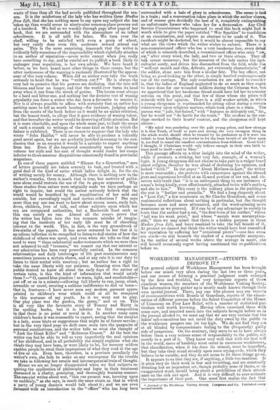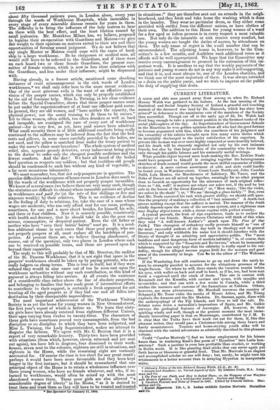WORKHOUSE MANAGEMENT.—ATTEMPTS TO IMPROVE IT.*
Toe general subject of Workhouse Management has been brought before our minds very often during the last two or three years,. and our means of forming a practical judgment much enlarged by the firm and truthful, but very temperate reports of those excellent women, the members of the Workhouse Visiting Society. The information they gather up is mostly made known through their own special journal. There, any one who pleases may see reports of communications with Boards of Guardians, reports of the extuni--. nation of different persons before the Select Committee of the House of Commons on Poor Law Relief, with a number of statistical par- ticulars well worth knowing. Having often examined these with some care, and inquired much into the subjects brought before us in the journal alluded to, we must say that we are very certain that the ladies' sub-committee has not rated the duty _owed by the public to the workhouse paupers one jot too high. We do not find they are at all blinded by compassionate feeling to the (frequently) guilty side of pauperism. On the contrary, they seem to us to have always before them a very serious sense of responsibility to the public, not merely to a part of it. They know very well that with the best will- in the world, cases of hardship must occur in enormous workhouses,. that classification, when it has done its utmost, must be imperfect., but they take their stand steadily upon sonic crying evils, which they believe to be curable, and they do not mean to let these things go on.
It appears to us that they are, if anything, a little too cautious. It is plain they do their work in fear and trembling, and are constantly dreading lest an imprudent act, though probably none of theirs, or an exaggerated word, should bring about a prohibition of their attend- ance on the sick and aged. And it is very difficult to over-estimate the importance of their post. One must first realize the fact that
• Journal of the Workhouse Visiting Society. Longman and Ca Published every^ second month.
about fifty thousand patients pass, in London alone, every year through the wards of Workhouse Hospitals, while incurables in every stage of every miserable disease remain for years in them.
The difficulty is to bring the influence of the lady matron to bear on them with the best effect, and the least friction caused by
small jealousies. Mr. Monckton Milnes has, we believe, proposed to legalize their co-operation with Guardians and Matron—to give fair weight to their opinions on matters suited to their sex and their opportunities of forming sound judgment. We do not believe that any single Master or Matron could cope with the cases of hard- ship in a large workhouse. Be he clergyman or medical man, all would still have to be referred to the Guardians, and if there were on each board two or three female Guardians, the present com- mittee of female visitors, which is now in less close relations with the Guardians, and less under their influence, might be dispensed with.
Having already, in a former article, mentioned some shocking instances of cruel mismanagement in the sick wards of London workhouses,* we shall only refer here to the more recent evidence. One of the most grievous evils is the want of an effective super- vision of the pauper nurses, which can only be properly established by the aid of feminine help. Miss L. Twining, in her clear evidence before the Special Committee, shows that these pauper nurses must be put under the superintendence of at least one efficient paid nurse. In general, they are old women, and "have neither the capacity, the physical power, nor the moral training to fit them to be nurses." Yet to these women, often selfish, too often drunken as well as hard and incapable, are consigned the care of every sort of workhouse patient—for in very few, as yet, have paid nurses been admitted. What small security there is of little additional comforts being really continued to the sufferers may be inferred from the fact that the bed- rests and pillows, in some cases carefully provided by the ladies, are not used, and the pillow is snatched 'from under the weary patient to make the nurse's chair more luxurious ! The whole system of medical relief, also, appears grossly defective, every inducement being given to the doctor to order only the cheapest possible medicines and the fewest comforts. And the diet ! 'We have all heard of the boiled beef question as respects our soldiers : but that toothless old people should be condemned to such fare without any kind of vegetable, is a far more monstrous inhumanity. We must remember, too, that not only paupers are in question. The
uliar difficulties and expense of honse-room in London does much to
the wards of the workhouse with not properly pauper incurables. We know of several cases (we believe there are very many such, though the statistics are difficult to obtain) where incurable patients are placed in workhouses and paid for (at the rate of five shillings or five and sixpence weekly) by their relatives. This is no evidence of decline in the feeling of duty to relations, for, take the case of a man whose wages are moderate, who can only afford rent for one room, perhaps, sometimes, for one and a mere closet besides, for himself, his wife, and three or four children. Now it is scarcely possible, consistently with health and decency, that lie should take in also the poor can- cerous, consumptive, or dropsical patient. Even the old father or mother who have "seen their bairns' bairns" must go. It is a need- less additional shame in such cases that these poor people, who are not properly paupers at all, must endure all the hardships of pau- perism. At present there are, we believe (leaving almshouses, of course, out of the question), only two places in London where such can be received on possible terms, and those are pressed upon far beyond their capacities.
The reply to this will probably be that of Mr. Streeton, the auditor of the St. Pancras Workhouse, that it is not right that space in the paupers' workhouses should be taken up by paying patients, who are really lodgers on cheap terms. This is true in itself, but if they were refused they would in nine cases out of ten be soon cast upon the workhouse authorities without any such contribution, as this kind of payment is alwa s falling into arrears. At all events the existence
of a considerable class rather above the line of absolute pauperism, Kronstadt and the Kremlin, with caviare and qvass, with moujiks and and belonging to families that have made great if intermittent efforts isvostchiks ; and that one with a few weeks in Canada, while a third to contribute to their support, is certainly a fresh argument for not studies the manners and customs of the Samaritans at Nabloos. Others, treating all the aged paupers as if they had one and all fallen into however, are more adventurous. Mr. Marshall traverses the country of destitution by their disreputable improvidence. Schainyl,§ Mr. Tozer visits the monks of Mount Athos, and Mr. Young The most important achievement of the Workhouse Visiting explores the Amazon and the .R..io Madeira. Dr.. Seeman, again, dines with Society is as yet the home for young women in New Ormond-street, the anthropophagi of the Fiji Islands, and lives to tell the tale. Dr.
the first 'year's report of which is before us. We learn that sixty-
surveys the geological features of Auvergne. All, however, do their six girls Lave been already received from eighteen different Unions, spiriting wisely and well, though at the present moment the most imme- their ages varying from twelve to twenty-three. The characters of diately interesting paper is that on Montenegro, contributed by J. M. It these girls have sometimes proved very unmanageable, from the bad is clear that the Turks have their work cut out for them, if, like this discipline or no discipline to which they have been subjected, and pleasant writer, they would pass a Christmas-tide among those brave and Miss L. Twining, the Lady Superintendent, makes no attempt to hardy mountaineers. Tourists and home-staying youth alike will be disguise the failures. We agree with Mr. C. Buxton that it is a report of very remarkable honesty. Thirty-two have been provided with situations (from which, however, eleven returned and are sent out again), ten have left in disgrace, four dismissed to their work- houses, seven sent to the colonies, eighteen are still in situations, and eighteen in the Home, while the remaining eight are variously accounted for. Of course the time is too short for any great result; perhaps it would have been more favourable had they been kept longer in the first instance, but it should be remembered that one principal object of the Home is to retain a wholesome influence over these young women, who have no friends whatever, and who, if re- turned to workhouses, would often be mixed up with the most abandoned women there. These poor girls are also allowed "a considerable degree of liberty" in the Home, " as it is desired to treat them and trust them as they will have to be treated and trusted mu H and Co. H • nis. Lib. i., if. Latino reddidit Carolus Merivale. Macmillan
• See Spectator for January 11, 1862. sad Co.
in situations :" they are therefore sent out ou errands in the neigh- bourhood, and they fetch and take home the washing which is done in the laundry. They wear no particular dress, as they either come provided with outfits from the different unions, or have clothes of their own. The addition to this Home for young women of a ward for a few aged or infirm persons is in every respect a most valuable one. Not only do the incurable or sick receive every comfort, but the young women are taught the duties of nurses, by attendance on them. The only cause of regret is the small number that can be accommodated. The adjoining house is, however, to be the Com- mittee's in a few months, and doubtless such additional room as it affords will be well appropriated. We hope that the Committee may 'receive every encouragement to proceed in the extension of this im- portant work. It is needless to say that the weekly payments of the patients and young women do not in any way make it self-supporting, and that it is, and must always be, one of the London charities, and we think one of the most important of them. It was always intended as a drain on the public purse, and we wish to impress on the public the duty of supplying that drain.































 Previous page
Previous page